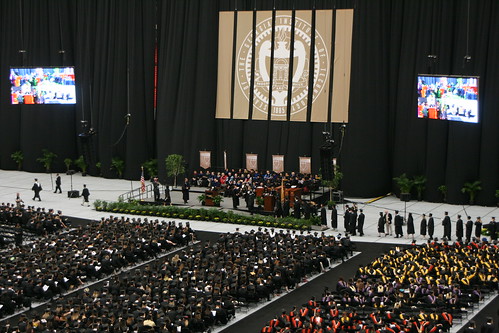Monday, May 30, 2011
Auto-wisdom - Conservation edition
I've been wondering as much about the link between traffic-rule-adherence and water conservation as I have about the definite article before "Water". Tell us, pray, which water?
Labels:
autos
Monday, May 23, 2011
The Graduate
I remember when I got my bachelor's degree in an austere ceremony that involved our clerk handing out a modest certificate through a hole in the wall and then sliding out a register for me to sign in, all strictly done without eye contact. A far cry from the pomp and gaiety and cheering that surrounded my sister's walk.
One reason for the elaborate ritual is surely tradition, but I also think that this kind of trumping up has one of two contrasting outcomes for kids watching. On the one hand it does appear that the recognition and sense of occasion lends an aspirational value to education. On the other, it also got me wondering if the exclusivity would perhaps make it appear inaccessible to some folks. I don't know the answer. All I know is that even the silly hats couldn't distract me from feeling lots of pride.
One reason for the elaborate ritual is surely tradition, but I also think that this kind of trumping up has one of two contrasting outcomes for kids watching. On the one hand it does appear that the recognition and sense of occasion lends an aspirational value to education. On the other, it also got me wondering if the exclusivity would perhaps make it appear inaccessible to some folks. I don't know the answer. All I know is that even the silly hats couldn't distract me from feeling lots of pride.
The graduation was the first of a series of "Oh she's really grown up" epiphanies. The other high point of the trip was meeting my remarkable nephew (among other things he digs Bakasura and seemingly gets his nutrition almost entirely from suspended particles in the air). A doff of the hat to his parents for being awesome hosts and Florida guides.
Saturday, May 07, 2011
Thoughts on Alternative Medicine
Last week I happened to visit Kolli hills in the eastern ghats of Tamil Nadu, accompanying a friend who was deploying an IT solution for a rural health care non-profit called Isha foundation. While the cool mountain air was in itself an incentive, a welcome break from the Thanjavur summer, the trip was interesting in many other ways.
Isha Foundation has a unique approach to health care; as part of the Ayush program, they try to combine Indian traditional medicine with modern practices. It got me thinking about where I stand on the issue of using altenate medicine. As a philosophy I whole-heartedly buy the guiding principle of these systems, which as I understand, is to empower the body to fight illnesses rather than curing the disease or symptom directly. With its recent emphasis on preventive-promotive practises, I believe that modern medicine is going down this path too.
However, here are reasons I am unsettled by traditional practices
Isha Foundation has a unique approach to health care; as part of the Ayush program, they try to combine Indian traditional medicine with modern practices. It got me thinking about where I stand on the issue of using altenate medicine. As a philosophy I whole-heartedly buy the guiding principle of these systems, which as I understand, is to empower the body to fight illnesses rather than curing the disease or symptom directly. With its recent emphasis on preventive-promotive practises, I believe that modern medicine is going down this path too.
However, here are reasons I am unsettled by traditional practices
- Methodology: Alternative schools of medicine so overwhelmingly rely on axioms - Ayurveda's chakras, homoeopathy's dynamisation/potentisation - which by their very definitions become inherently unverifiable using conventional scientific approaches. Some even claim this transcendental pretensions to be the strong points of these systems.
- Faith: These schools rely on their practitioners' and followers' faith. There are several consequences of that mentality. For one, the onus of proof is on the skeptic. Conversely, any literature in these fields, as I gather, seem to be guided by strong confirmation biases because proponents seem to have reached their conclusions even before they have started the research. That's another reason why anecdotal evidence is so rife; everybody's got an uncle whose cancer miraculously disappeared! Faith also leads people to believe that there are no side-effects in alternative therapies. I would be very surprised if Ayurveda's reliance of heavy metals such as Arsenic and Mercury is completely healthy.
- Lack of openness: I'll be the first to admit that I'm a critic of several aspects of modern medicine. Antibiotic overdose, short-term curative approaches, influence of pharmaceutical companies etc deserve our disdain. Yet, science did come up with vaccination for small-pox, cure for polio, unbelievably complicated surgical practices, none of which were cracked by the all-knowing traditional systems for thousands of years. Somehow, all traditional practices seem to aspire for glory by disparaging modern medicine (including by using that condescending term 'Allopathy'). Empirical skepticism towards science is healthy and necessary, disdain is dangerous.
- Talent: Let's face it, traditional systems are not great at attracting talented people. How many of the smart folks (if intelligence is too subjective, think "perseverant" , "industrious", "resourceful" or any other adjective of your choice) you know from school actually wanted to go to and eventually went to these courses? The most passionate followers of Ayurveda and Homoeopathy that I personally know, I suspect, would advice their kids to take up MBBS over BMS if they are ever in a position to make that choice. What chance does that give these systems to produce a vibrant community of researchers and innovators?
Subscribe to:
Comments (Atom)



